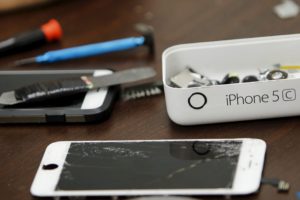Apple has been ordered to develop software for a very important reason. Even so, the tech giant is right to resist.
A magistrate judge, acting on a request by the Federal Bureau of Investigation, says Apple must help law enforcement disable safety features on an iPhone 5C. The device was owned by Syed Farook, who was part of the husband and wife shooting team in the San Bernardino attacks.
Users of iPhones can choose to have data automatically deleted if an incorrect passcode is entered too many times. A secondary feature progressively slows down passcode guesswork. Both are safety features, intended to keep the user’s personal information and data private.
The good news is, if the G-Men can’t bypass them on their own, the features obviously work.
But the latest court order demands Apple do three things:
1) bypass or disable the auto-erase feature; 2) allow passcode submissions to the phone by port, Wi-Fi, Bluetooth or other means; and 3) bypass or disable any time delays.

Tim Cook, chief executive at Apple, responded that while he and his company “have no sympathy for terrorists,” the government is asking too much.
“Compromising the security of our personal information can ultimately put our personal safety at risk. That is why encryption has become so important to all of us,” he wrote in an open letter to Apple customers.
“For many years, we have used encryption to protect our customers’ personal data because we believe it’s the only way to keep their information safe. We have even put that data out of our own reach, because we believe the contents … are none of our business.”
Cook insists that Apple has worked alongside the FBI following the San Bernardino shootings and provided all the data currently in their possession. The company is resisting this latest order, he says, because it essentially requires creation of a “back door” into its product, which could place the personal information of other users at risk.
“The government is asking Apple to hack our own users and undermine decades of security advancements that protect our customers — including tens of millions of American citizens — from sophisticated hackers and cybercriminals. The same engineers who built strong encryption into the iPhone to protect our users would, ironically, be ordered to weaken those protections and make our users less safe,” Cook wrote.
There are technical details related to the age of this phone, current hardware version and encryption tanglements that make the government’s request slightly less irksome. But it remains unprecedented.
Companies have been compelled by the court to create scraping or search code to aid in criminal investigations, but that’s not what the government wants in this instance. It is demanding Apple engineers break what they created and hand over the exposed bits.
Terrorism is a real, horrific part of our world. But the fact it exists, or that it has claimed American lives, isn’t enough to justify government overreach into proprietary software or personal information.
This column by Lynda Waddington originally published in The Gazette on February 20, 2016. Photo credit: Eduardo Munoz/Reuters
